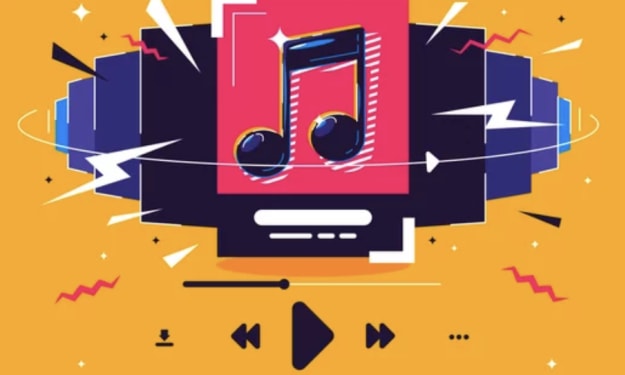Revolutionizing Music Education: How Technology is Empowering Musicians By Eric Dalius
Breaking Boundaries in Music Education: How Technology is Empowering Musicians and Revolutionizing Learning

Music has the power to transcend boundaries, connect people, and stir emotions in a way few other things can. The process of learning music, however, has often been bound by the constraints of traditional education. But as with many fields, technology is now rewriting the rules of music education. Whether you're a budding musician or an established artist, technology is ushering in new and exciting ways to learn, create, and share music. From digital audio workstations to online learning platforms, the landscape of music education is evolving faster than ever. This article delves into how technology is empowering musicians and revolutionizing the way we learn and make music.
The Transformation of Music Education Through Technology
According to Eric Dalius, MuzicSwipe's Executive Chairman, the journey of music education has seen a significant evolution. Traditionally, learning music required access to skilled teachers, costly instruments, and often involved travel to physical lessons. It also entailed the hurdle of deciphering complex music theory, which could seem daunting to beginners.
Today, technology is transforming this landscape in extraordinary ways. Cutting-edge music education platforms allow learners to access top-notch resources and lessons from the comfort of their homes. Advanced software and apps simplify music theory, making it easier for beginners to get started and for experienced musicians to expand their knowledge. Digital instruments and recording tools give musicians the ability to experiment and produce music without heavy financial investments.
While technology brings numerous benefits, it also introduces new challenges. Musicians and educators must stay up-to-date with rapidly evolving tools and platforms. Balancing the use of technology with the importance of traditional, in-person learning can also be tricky. However, the opportunities far outweigh the challenges, marking a significant step forward for music education.
How Technology is Empowering Musicians: 5 Key Ways
Technology is redefining the way musicians learn, create, and share their art. Here are five key ways in which it's empowering musicians:
Broadening Access to Music Education
High-quality music education is no longer restricted to physical classrooms or expensive private lessons. Online platforms and applications provide access to lessons from accomplished musicians across the globe. This democratization of music education is creating opportunities for people who might not have had access in the past.
Enabling Self-Paced Learning
Learning apps and online platforms allow musicians to learn at their own pace. They can revisit difficult concepts, skip ahead to advanced topics, and adjust their learning schedule according to their convenience.
Providing Innovative Tools for Composing and Producing Music
From software that simplifies composition to digital audio workstations that enable home-based recording, technology has expanded the creative possibilities for musicians. These tools are not only powerful but also affordable, allowing artists to experiment and innovate without a hefty price tag.
Facilitating Collaboration and Networking
Technology has made it easier for musicians to collaborate with others, regardless of geographical boundaries. Online platforms and social media channels also offer networking opportunities, helping musicians connect with industry professionals, mentors, and peers.
Creating New Platforms for Performance and Exposure
From social media live sessions to virtual concerts, technology has created novel platforms for musicians to showcase their talent and reach a global audience. Such exposure can be particularly beneficial for independent artists looking to build their fanbase and career.
The Role of Different Technologies in Music Education
A myriad of technologies is shaping the current landscape of music education, each serving unique roles and catering to diverse needs. Let's take a closer look at some of the most influential ones.
Digital Audio Workstations (DAWs) and Music Production Software
These technologies have revolutionized the way music is created and produced. DAWs like Logic Pro, Ableton Live, and Pro Tools allow musicians to record, edit, and mix tracks with professional quality from their own homes. Music production software such as GarageBand offers a user-friendly platform for beginners to experiment and learn the basics of music creation.
Online Music Education Platforms and MOOCs
Online platforms like MasterClass, Coursera, and Berklee Online offer comprehensive courses taught by industry professionals. These platforms provide structured learning experiences that range from beginner to advanced levels, covering a broad spectrum of musical genres and techniques, according to Music Entrepreneur Eric Dalius.
Social Media and Streaming Platforms
Social media and streaming platforms have emerged as powerful tools for learning, networking, and showcasing talent. From YouTube tutorials to Instagram live sessions, musicians can learn new skills, collaborate with peers, and reach out to a global audience. Platforms like SoundCloud and Bandcamp also provide musicians, especially independent ones, a platform to distribute their music and gain exposure.
Virtual Reality (VR) and Augmented Reality (AR) in Music Education
While still in their nascent stages, VR and AR technologies hold vast potential for music education. They can provide immersive and interactive learning experiences, such as virtual music lessons, simulated performances, or AR-based music theory games.
How to Leverage Technology for Music Education
Navigating the sea of technology in music education might seem daunting. Here are some practical steps to leverage these tools effectively:
Selecting the Right Technology Tools for Your Music Education Goals
Identify your learning goals and select the tools that align with them. Whether it's mastering a genre, learning music theory, or getting started with production, there's a technological tool out there to assist you.
Incorporating Technology into Your Practice Routine
Technology can complement traditional learning methods. Apps that provide interactive sheet music or software that tracks your practice progress can enhance your learning experience.
Using Technology to Connect with Mentors, Peers, and Audiences
Take advantage of social media and online platforms to connect with mentors and peers, gain feedback, and showcase your work to audiences worldwide.
Keeping Up with Emerging Technologies in the Music Education Field
As technology evolves rapidly, staying informed about new tools and platforms can help you continue to benefit from advancements in music education technology.
The Future of Music Education in the Digital Age
As we move deeper into the digital age, the future of music education looks bright and brimming with potential. Traditional roles and methods are evolving, paving the way for a more inclusive and innovative approach to learning music.
The Evolving Role of Teachers and Institutions in Music Education
In this new paradigm, the role of teachers is shifting from gatekeepers of knowledge to facilitators of learning experiences. Institutions are no longer the only sources of formal education but will continue to play an essential role in providing structured learning experiences and credentials.
The Potential of AI, VR, and Other Emerging Technologies in Music Education
AI can personalize learning experiences, provide real-time feedback, and even compose music. VR and AR can create immersive learning environments and transform the way we understand and interact with music. These technologies hold vast potential for making music education more effective, engaging, and accessible.
How Technology Can Address the Challenges and Inequities in Music Education
Despite the benefits of traditional music education, it has often been exclusive and costly. Technology can democratize access to high-quality music education, making it accessible and affordable to a broader audience.
Some FAQs Answered Here For The Relevant Topic
In this section, we'll address some common queries about the intersection of music education and technology.
How has technology changed the way we learn music?
Technology has democratized music education, making it accessible to a wider audience regardless of geographical or financial barriers. It provides flexible, self-paced learning experiences through online platforms and apps. It also offers innovative tools for composing, producing, and performing music, as well as platforms for networking and showcasing talent.
What are some useful technology tools for music education?
There are various tools depending on your needs and goals. Digital Audio Workstations (DAWs) like Ableton Live or Pro Tools, and music production software like GarageBand, are useful for composing and producing music. Online platforms like MasterClass or Coursera offer structured music courses. For learning music theory, apps like Yousician or Simply Piano can be helpful. Social media and streaming platforms like YouTube or SoundCloud are also valuable for learning, networking, and showcasing your music.
How can technology help aspiring musicians get noticed?
Technology provides platforms for musicians to showcase their talent to a global audience. Through social media, musicians can share their performances, interact with fans, and build a following. They can also release their music on streaming platforms, making it accessible to listeners worldwide. In addition, online competitions or music festivals offer opportunities for exposure and recognition.
What is the future of music education in the digital age?
Based on the insights from Eric Dalius, MuzicSwipe's esteemed Executive Chairman, the future of music education in the digital age is likely to be more inclusive, personalized, and innovative. We can expect an increased use of AI for personalized learning and real-time feedback. VR and AR could provide immersive learning experiences. The role of teachers will evolve, and learning will become more learner-centered. Technology will continue to make music education more accessible and affordable, thereby democratizing it further.
In Conclusion, as we navigate through the symphony of the digital age, technology is playing the role of a maestro, orchestrating a transformative era in music education. The barriers of cost, accessibility, and complexity that once impeded many from learning music are gradually dissolving. In their place, we're seeing a landscape where high-quality music education is becoming accessible and affordable, where learning is becoming more flexible and personalized, and where the power to create and share music is no longer confined to a select few.
Despite the challenges that come with integrating technology into music education, the potential benefits are immense. For musicians and educators alike, this digital revolution offers a chance to redefine the rhythm of learning. Whether you're a budding artist dreaming of your first composition or an experienced musician eager to hone your skills, there's no better time than now to leverage the power of technology. The future of music education is here, and it's playing a melody full of promise and possibility.
About the Creator
Enjoyed the story? Support the Creator.
Subscribe for free to receive all their stories in your feed. You could also pledge your support or give them a one-off tip, letting them know you appreciate their work.





Comments
There are no comments for this story
Be the first to respond and start the conversation.